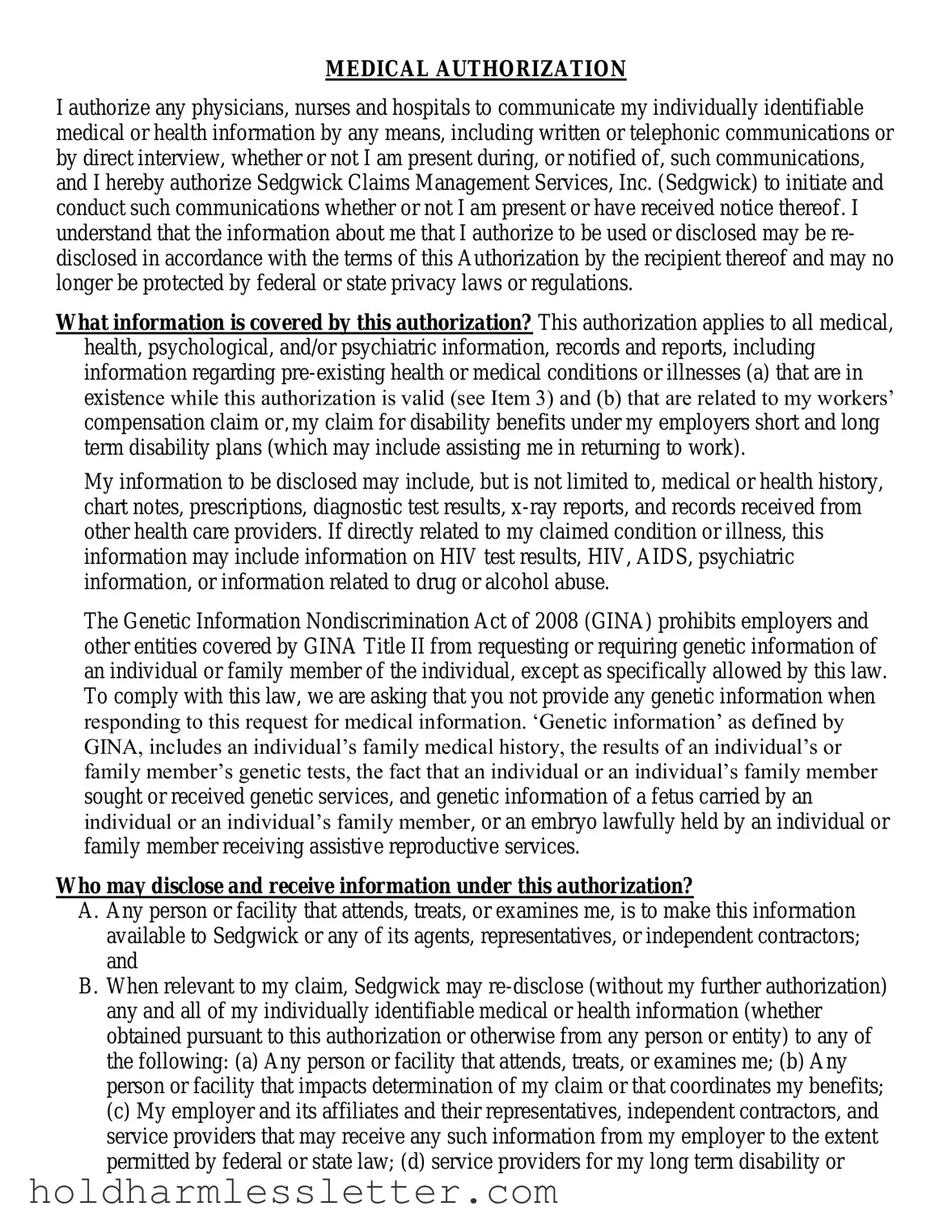MEDICAL AUTHORIZATION
I authorize any physicians, nurses and hospitals to communicate my individually identifiable medical or health information by any means, including written or telephonic communications or by direct interview, whether or not I am present during, or notified of, such communications, and I hereby authorize Sedgwick Claims Management Services, Inc. (Sedgwick) to initiate and conduct such communications whether or not I am present or have received notice thereof. I understand that the information about me that I authorize to be used or disclosed may be re- disclosed in accordance with the terms of this Authorization by the recipient thereof and may no longer be protected by federal or state privacy laws or regulations.
What information is covered by this authorization? This authorization applies to all medical, health, psychological, and/or psychiatric information, records and reports, including information regarding pre-existing health or medical conditions or illnesses (a) that are in existence while this authorization is valid (see Item 3) and (b) that are related to my workers’ compensation claim or, my claim for disability benefits under my employers short and long term disability plans (which may include assisting me in returning to work).
My information to be disclosed may include, but is not limited to, medical or health history, chart notes, prescriptions, diagnostic test results, x-ray reports, and records received from other health care providers. If directly related to my claimed condition or illness, this information may include information on HIV test results, HIV, AIDS, psychiatric information, or information related to drug or alcohol abuse.
The Genetic Information Nondiscrimination Act of 2008 (GINA) prohibits employers and other entities covered by GINA Title II from requesting or requiring genetic information of an individual or family member of the individual, except as specifically allowed by this law. To comply with this law, we are asking that you not provide any genetic information when responding to this request for medical information. ‘Genetic information’ as defined by GINA, includes an individual’s family medical history, the results of an individual’s or family member’s genetic tests, the fact that an individual or an individual’s family member sought or received genetic services, and genetic information of a fetus carried by an individual or an individual’s family member, or an embryo lawfully held by an individual or family member receiving assistive reproductive services.
Who may disclose and receive information under this authorization?
A.Any person or facility that attends, treats, or examines me, is to make this information available to Sedgwick or any of its agents, representatives, or independent contractors; and
B.When relevant to my claim, Sedgwick may re-disclose (without my further authorization) any and all of my individually identifiable medical or health information (whether obtained pursuant to this authorization or otherwise from any person or entity) to any of the following: (a) Any person or facility that attends, treats, or examines me; (b) Any person or facility that impacts determination of my claim or that coordinates my benefits;
(c) My employer and its affiliates and their representatives, independent contractors, and service providers that may receive any such information from my employer to the extent permitted by federal or state law; (d) service providers for my long term disability or
workers’ compensation claim; or (e) The Social Security Administration or a social security or vocational rehabilitation vendor. Sedgwick may use my information obtained pursuant to this authorization in any other claim matter that Sedgwick may administer or handle related to me.
How long is this authorization valid? This authorization is valid during the duration of my claims and any future related claims, unless a different period is required under applicable federal or state law. (Release in connection with a claim for benefits for health insurance may not remain valid longer than the term of coverage of the policy; or for the duration of the claim for all other insurance claims.)
Revocation of this authorization. Unless otherwise provided by federal or state law, I understand that I may revoke this authorization at any time by notifying Sedgwick, in writing, of my revocation and that my revocation shall be effective upon Sedgwick’s receipt of my notice of revocation. I also understand that my revocation of this authorization will not have any effect on any actions taken by Sedgwick before it receives my revocation.
Processing of claims. I understand that this authorization is generally necessary for the processing of my claim. Failure to sign this authorization will likely impair or impede the processing of my claim.
Refusal to sign. I further understand my health care providers will not condition my treatment, payment, enrollment, or eligibility on my refusal to sign this authorization.
I understand that I have the right to request and receive a copy of this authorization. I understand that I have the right to inspect the disclosed information at any time. A photocopy of this authorization shall be valid and is to be accepted with the same effect as the original.
Printed Name of Patient or |
|
|
|
|
Representative’s Relationship to Patient, |
|
Patient’s Representative |
|
|
|
|
if applicable |
|
|
|
|
|
|
|
|
|
|
|
Claim Number |
Last 4 Digits of Patient’s SSN |
|
Patient’s Date of Birth |
|
|
|
|
|
|
|
|
Signature of Patient or Patient’s Representative |
|
Date Signed |
|
|
|
Sedgwick 5/2017 |
Sedgwick Claims Management Services, Inc. |

